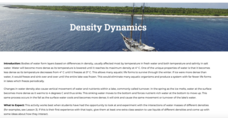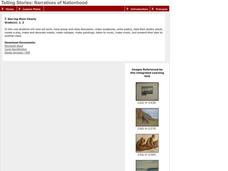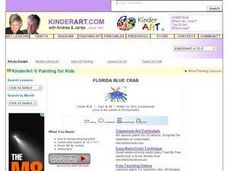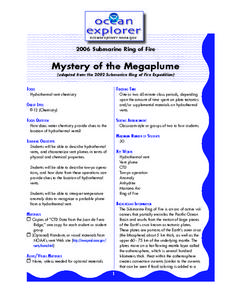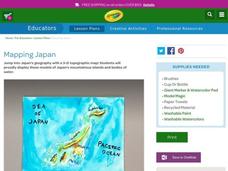NOAA
Animals of the Fire Ice
When the sun's rays can't reach the producers in a food web, where does all the energy come from? Extreme environments call for extreme food sources. Young scientists investigate creatures that appear to get their energy from methane...
Polar Trec
Why Can’t I Eat This Fish?
Can turning on the television lead to toxins in the food supply? The lesson offers an opportunity for young scientists to complete guided research. A worksheet lists each question as well as the web page necessary to answer the question....
Society for Science & the Public
Easter Islanders Made Tools, Not War
When studying artifacts, especially tools, how do archaeologists determine what the devices were used for? In what ways might researchers' previous experiences influence their perception of an artifact? An article about researchers'...
Curated OER
Who Am I?
Youngsters find these common sea plants and animals using a worksheet. Each of the plants and animals has a colorful representation on the worksheet. There is an answer key at the bottom of the worksheet that has all of plant and animals...
Curated OER
Who am I?
Here is a colorful worksheet which requires young ornothologists to correctly identify 16 birds by matching them up with their name which appears at the bottom of the worksheet. Each of the birds has an accurate and colorful picture...
Curated OER
Density Dynamics
Students set up working models demonstrating lake turnover and the formation of deep water masses in the oceans.
Curated OER
Sea-ing More Clearly
Explore works of art with your class by engaging them in a variety of artistic activities including papier-mache sculpture, poetry, performance, and more. After viewing and discussing four paintings of the sea by Robert Harris, learners...
Curated OER
Under the Sea
Tropical fish are a great subject for any art project, they are colorful, interesting, and can go along with under water themed stories read in class, learner written narratives, or Marine Biology units. This set of instructions will...
Curated OER
So Much Water, So Little to Drink
Students explore salt and fresh water. In this water lesson, students investigate the amount of Earth covered by water. Students compare the amounts of salt water to fresh water. Students create a visual representation to aid comprehension.
Curated OER
Marine Energy
In small groups, energy engineers research and make a topographic map of a marine natural resource. They report to the rest of the class pros and cons of extracting their assigned resource. The two activities may take up to four class...
Curated OER
Salt Water Revival
Students produce a high tide. In this Marine Biology lesson, students visit a tide pool to investigate the creatures response to changes in the tide. Students discuss the results of their experimentation.
Curated OER
Stacking Water
Young scholars experiment with different salinities of water using straws and different colors of water. They collect and interpret data from the experiment.
Curated OER
1492: Using Data to Explain a Journey
Students examine how Christopher Columbus made his way across the Atlantic. In this data lesson students use an Internet program to navigate like Columbus.
Curated OER
Where Am I?
Extensive background on marine navigation is provided for you as the teacher. Assign groups to research marine navigation techniques and construct astrolabes. Resource links are listed for extension ideas. If you are teaching an...
Curated OER
Florida Blue Crab
Explore the extraordinary creatures of the ocean! Learners create Florida Blue Crabs (imitation of course) using blue paint and their hand prints. This is a cute supplementary project perfect for an ocean-themed unit or preschool...
Curated OER
Mystery of the Megaplume
Read through the extensive background information and then lead your geology or physical oceanography class through an investigation of actual temperature anomaly data from the Juan de Fuca ridge. They translate the data onto a plot,...
Curated OER
A Whaling Voyage
Students plot the track of a whaling voyage and relate it to ocean currents. They need to explain and use latitude and longitude to plot ship positions on the globe.
Curated OER
Boat Safety and Water Sports - Lesson 4 - Dangerous Sea Creatures
Lesson 4 is part of a 22 lesson plan unit on boat safety and water sports. This lesson plan is about dangerous sea creatures, mainly in the ocean. There is a link to find pictures of the creatures discussed. It is suggested to click...
Curated OER
Mammals of the Deep Blue
Third graders study ocean mammals. They explore various websites and databases to answer questions and record answers about whales and dolphins. Finally they use the information obtained to write a report about them.
Curated OER
Glaciers on the Move
Students study how glaciers form, move, and change the Earth's landscape. They research information about the effects of global warming on glaciers and sculpt a detailed replica of mountains with glaciers calving into the ocean.
Curated OER
Leader of the School
Young scholars are read a book about the oceans and discuss the characterstics of the main character that makes him a leader. As a class, they use sponges and contruction paper to make their own ocean scene. To end the lesson, they add...
Curated OER
Mapping Japan
Young scholars research the islands of Japan to investigate their location in the world and the islands' characteristics. They comprehend map making and topography. Studnets construct a scale-model map of the Japanese islands and...
Curated OER
Transatlantic Travel
Young scholars design an interactive map with modes of transportation that actually move across the ocean. They construct transatlantic maps of the northern hemisphere and imagine what it would be like to operate various modes of...
Curated OER
Tropical Island
Young scholars research information about a specific tropical island and locate it on a world map. They study details about coral reefs and other animal and plant life on the island and determine how ocean currents affect the island's...
Other popular searches
- Oceans
- Oceanography
- Continents and Oceans
- Ocean Currents
- Ocean Mammals
- Ocean Food Chain
- Ocean Explorers
- Ocean Animal Adaptations
- Continents Oceans
- Oceans and Seas
- Ocean Floor
- Oceanography Science





